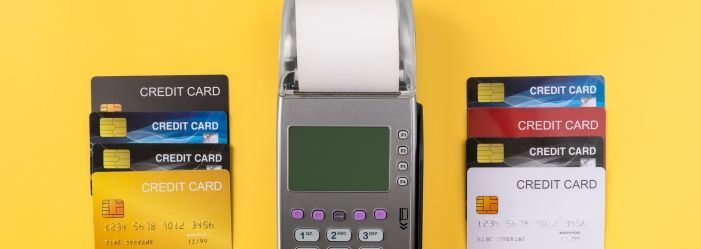Last Updated: December 18, 2023
Smart Usage of Credit Cards

Disclaimer: We are not qualified legal or tax professionals and are not giving advice. Always speak with a qualified professional before making any legal or financial decisions.
Credit cards are great, as long as you use them correctly. They are essential to building credit and to making hotel and airline reservations. They are almost universally accepted. However, they can also funnel you into a lifetime of debt. Should you own a credit card? Let’s take a look at the positives and negatives.
What Is a Credit Card and How Do They Work?
Credit cards are basically a revolving loan issued by a credit card company and accessed through an account number printed on a plastic card. Your credit limit is based on your income, your credit history, and how likely the issuer thinks you will pay back the loan, ie, your purchases.
Some credit cards are secured. This means that you have a certain amount held in a savings account. This is your credit limit. If you pay your bill regularly, the credit limit doesn’t drop. If you fail to pay your bill, money is removed from your credit card and the credit limit is dropped to the remaining amount. Secured cards are great for first time credit card users and those rebuilding their credit history.
In exchange for the loan, you pay an interest rate (APR) and, depending on the card, fees. Failure to pay also incurs penalties.
Read about What is a Good APR
Credit Card Type Comparison
| Credit Card Type | Rewards/Benefits | Ideal For | Things to Watch Out For |
|---|---|---|---|
| Cash Back | 1-6% cash back on purchases | Those who want money back on spending | Low redemption values, caps on earnings |
| Travel Rewards | Points/miles for travel bookings | Frequent travelers | Blackout dates, limited airline partners |
| 0% Intro APR | 0% interest for 12-21 months | Financing a large purchase | Rates shoot up after the intro period ends |
| Balance Transfer | 0% intro APR on transferred balances | Paying down existing debt | Balance transfer fees, intro rate expiration |
| Secured | uild credit with a refundable deposit | Bad credit or new credit | Credit limit capped at deposit amount |
Credit Card Pros
Credit cards can be safer than cash or debit cards. If cash is stolen, it is generally gone. Debit Cards that are used fraudulently can be reversed but no guarantee will happen. With a credit card, once you notify the company of fraudulent charges, you are not liable. Another benefit is credit card companies keep an eye out for odd charges and can notify you that your card has been hacked. (Tip: Always return calls from the fraud department!).
Credit cards help with disputes. If you have a dispute with a merchant, you can involve the credit card company and possibly get the situation reversed. Try that with cash!
Credit cards make travel easier. Most airlines and hotels want a credit card number. Hotels want a way to recoup stolen towels and room damage. If you use a debit card, the hotel may place a hold on your account, meaning you suddenly have no access to your money until the hold is lifted. In addition, most countries accept credit cards (but not debit cards), and your exchange rate may be far better than changing money.
Credit cards help build credit, and learning how prepaid credit cards can also boost your credit score is beneficial. Using one responsibly and paying off balances on time can be great for your credit score. Credit cards may come with perks that most people don’t use. Those can include rental car insurance, travel insurance, and even product warranties.
Credit cards help build credit. Using one responsibly and paying off balances on time can be great for your credit score. Credit cards are great in an emergency! And finally, many credit cards come with perks like travel miles and cash back. As long as you can pay off your credit card each month, there are many pros to having one.
Read about What Credit Cards Should I Get
Credit Card Cons
Interest rates tend to be higher than other loans because credit cards are generally unsecured. This means that there is nothing the lender can repossess to help pay off the debt. Read about Banks Closing Credit Cards and Cutting Credit Limits.
Failure to pay off a credit card in full each month leads to interest changes that can build your debt quickly. Failure to pay also counts heavily against your credit. Credit cards can be hard to understand. The fine print is very finely printed in a tiny font.
The good stuff like the 0% interest rate, which you can learn more about here, is in huge font. The good stuff, like 0% interest rate, is in huge font. The problem is that if you skip the fine print, you may miss the sudden increase in interest, the penalties, and the fees that make the card less than desirable.
Credit card minimum payments are designed so that you pay off interest and penalties first with a tiny bit going to the principal. It can take forever to pay off a card card using minimum payments and the lender is fine with that. It is, after all, how they make the majority of their money.
Credit cards offer easy access to cash advances, which raises the question of whether you can pay a credit card with another credit card. They then levy a processing fee and stiff interest rate that begins the day you take out the money, not the due date.
Credit cards offer easy access to cash advances. And then levy a processing fee and stiff interest rate that begins the day you take out the money, not the due date. It is also very easy to use credit cards to make up a shortfall in income. However, you will very quickly get into debt.
Read about California Residents Getting Sued Over Credit Card Debt
Cash Versus Credit Cards
There are some good reasons to use a credit card for your purchases. You’ll get some protections that don’t come along with cash. However, you may get a better deal if you offer cash since merchants don’t have to pay fees to the credit card company.
If you can’t pay off your card every month, use cash (or a debit card instead). This will also force you to not overspend.
Should I Get a Credit Card?
The answer to whether or not you should own a credit card ultimately depends on you and your spending habits. Appropriate use of a credit card can be great. If you are subject to impulse spending or using the card to make up any shortfalls in income, a credit card can harm your financial future.
Read about
30 Days Without Spending Money
Credit Card Alternatives
While credit cards can be useful for building credit and financing some purchases, they aren't the only option.
Here are some alternatives to consider:
- Secured Credit Cards: These cards require an upfront security deposit that becomes your credit limit. They can help build credit for those new to credit or with bad credit. The deposit is fully refundable with responsible use.
- Retail Credit Cards: Store credit cards tend to have easier approval standards and can help establish a credit history. Just be cautious of only making minimum payments and high APRs.
- Credit Builder Loans: Small loans designed specifically to help build credit history as on-time payments are reported to credit bureaus. Interest rates are usually lower than credit cards.
- Experian Boost: A free program that lets you add positive payment history for phone, TV/internet, utilities and more directly to your Experian credit report. This can help build credit without needing a credit card.
More on Credit Card Traps
- Deferred Interest Promotions: If a credit card balance in a "no interest" introductory period isn't fully paid by the end of the promotional timeframe, you'll suddenly owe all the back interest from day one.
- Universal Default Policies: Some issuers will raise interest rates if you are ever late on payments with ANY other creditor - even a single phone bill - regardless of on-time payments with your credit card.
- Excessive Late Fees: $30+ late fees significantly above the cost to the issuer of $0-8 are still charged by many companies looking to profit off minor slip-ups in payment schedules. Setting up autopay helps avoid them.
The Ease of Credit Card Debt
While credit cards offer convenience, it is incredibly easy to fall into serious high-interest credit card debt by overspending or just paying the minimum due every month. If you struggle with impulse purchases or budgeting, strongly consider if a credit card is right for you and be extremely cautious in use if you do open one. Credit card debt can be crippling.
Credit Card Recommendations by User Profile
- Recent College Grad: A student credit card with a low credit limit can help build credit without overspending risk. Consider adding them as an authorized user on a parent's account instead.
- Parent with Young Kids: Hold off for now. Expenses like childcare can lead to quick debt accumulation. Consider alternative options to build credit without the temptation to overspend.
- Frequent Traveler: A travel rewards credit card offering points/miles makes sense. Just be sure to pay in full each month to avoid debt.
- A Retiree on Fixed Income: Not getting a card avoids the temptation to take on debt difficult to pay back. Consider a secured card or authorized user status instead.
FAQs
Conclusion
Credit cards, when used responsibly, can provide convenience and help build your credit profile. However, falling into credit card debt traps could seriously impact your financial health. Determine if opening a credit card aligns with your spending habits and budget before applying. If you currently struggle with overwhelming high-interest credit card balances you can’t repay, don’t hesitate to seek help.
Nonprofit credit counseling services can help you consolidate debt into one monthly payment and negotiate with creditors on your behalf. At Pacific Debt, our certified credit counselors have decades of experience helping people across California escape credit card debt and regain financial freedom.
Pacific Debt, Inc
If you have overused your credit cards and are deep in debt, you may need more help than just advice. If you’d like more information on debt settlement or have more than $10,000 in credit card debt that you can’t repay, contact Pacific Debt, Inc. We may be able to help you become debt-free in 2 to 4 years.
*Disclaimer: Pacific Debt Relief explicitly states that it is not a credit repair organization, and its program does not aim to improve individuals' credit scores. The information provided here is intended solely for educational purposes, aiding consumers in making informed decisions regarding credit and debt matters. The content herein does not constitute legal or financial advice. Pacific Debt Relief strongly advises individuals to seek the counsel of qualified professionals before undertaking any legal or financial actions.
Reduce Your Credit Card Debt By Up to Half

BBB Reviews | 4.9/5.0 Rating









 Do Not Sell My Personal Information
Do Not Sell My Personal Information